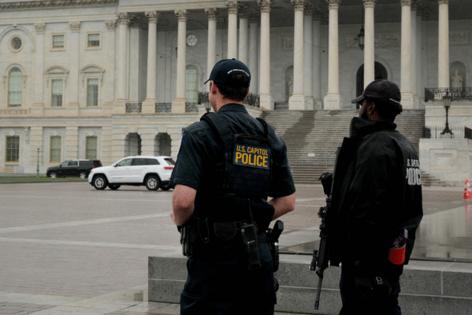Capitol Police nixes its equity and inclusion office
Published in News & Features
WASHINGTON — The U.S. Capitol Police department has quietly closed its office devoted to equity and inclusion, a spokesperson confirmed.
The shuttering of the office drew little fanfare, as the office was phased out “over the last couple of weeks,” according to the spokesperson.
It comes after Sen. Markwayne Mullin, R-Okla., questioned the mission of the office, which he said had a roughly $1 million budget.
“I’m having a hard time because OEI sounds a lot like DEI,” said Mullin, who chairs the Senate Legislative Branch Appropriations Subcommittee, during a May hearing.
Republicans in Congress and the White House are targeting diversity, equity and inclusion initiatives across the nation, vowing to stamp them out. This one was closer to home, as it was part of the police force that protects lawmakers and the Capitol campus.
At least some in the department cheered the move. Gus Papathanasiou, who leads the Capitol Police Labor Committee, thanked Mullin for raising the issue and Chief Michael Sullivan, who took over the department in June, for shutting down the office.
“It’s a step in the right direction. The OEI office was a waste of time and money for the USCP and wasn’t beneficial to the Officers, in my professional opinion,” Papathanasiou said in a text message Friday.
The office provided training, professional development and mentoring to Capitol Police officers and employees. As recently as this summer, the department included a “diversity” tab on its careers webpage. That section has now disappeared.
It’s not clear how Capitol Police will handle diversity efforts going forward. According to the spokesperson, “We realigned the office’s functions to support our Training Services Bureau and our Office of Human Resources.”
“The expertise that each person in our Department brings is critical,” the statement continued. “We need different backgrounds, experiences, and perspectives to recruit, retain and promote the best sworn and professional staff.”
The Office of Equity and Inclusion, which was formerly dubbed the Inclusion, Diversity, Equity and Action (IDEA) Office, had been led by Vilma Alejandro since 2022. Its goals included cultivating an inclusive workforce and improving the cultural climate, according to its strategic plan.
Over the years the Capitol Police has faced criticism and lawsuits from officers who alleged a toxic culture. In 2023, for example, the Office of Congressional Workplace Rights found the department had discriminated against a Black K-9 trainer.
During the May hearing, Mullin referenced data that broke down the demographics of the force and questioned whether the department had implemented racial quotas for hiring.
“If we’re trying to hire the best and brightest based on merit, then why would that chart even need to be in the OEI?” Mullin said. “I don’t see there’s a diversity issue, but OEI is making it an issue.”
Trump has set the tone for prioritizing an end to DEI. On the first day of his second presidential term, he issued an executive order that sought to root out DEI initiatives within the federal government, calling them “illegal and immoral discrimination programs.”
At the hearing, then-Capitol Police Chief J. Thomas Manger pushed back on Mullin’s charges that the department hired based on race. In an email this week, he said opponents of the office didn’t understand the value it brought to the department.
Equity is about “fairness, everyone having the same opportunities for success,” wrote the former chief, who retired in May. “What the f— is not to like about that?”
“Our view on diversity was that every employee, sworn or civilian, had a different life’s journey that brought them to the USCP. Nothing to do with race, gender, ethnicity, etc.,” Manger wrote. “We respect differences, we respect each other’s journey, we are on the same team.”
In its equity and inclusion strategic plan for fiscal years 2023 through 2026, the department published a series of tables breaking down its diversity by race/ethnicity and gender. As of December 2022, the sworn force was roughly 55 percent white, 30 percent Black and 10 percent Hispanic or Latino. Men accounted for 82 percent.
In its most recent annual report, the OEI touted a “shift towards a more diverse workforce on the sworn side” and in its recruitment efforts.
“The USCP Office of Equity and Inclusion did great work. They reviewed policies, they assisted in training, and were a resource for the entire agency,” Manger continued. “But those opposed to fairness, respect for all, and a strong team can high five themselves for getting rid of another DEI program.”
_____
©2025 CQ-Roll Call, Inc., All Rights Reserved. Visit cqrollcall.com. Distributed by Tribune Content Agency, LLC.







Comments